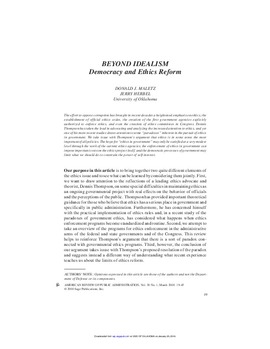| dc.contributor.author | Donald J. Maletz | |
| dc.contributor.author | Jerry Herbel | |
| dc.date.accessioned | 2016-01-14T19:53:05Z | |
| dc.date.accessioned | 2016-03-30T15:36:54Z | |
| dc.date.available | 2016-01-14T19:53:05Z | |
| dc.date.available | 2016-03-30T15:36:54Z | |
| dc.date.issued | 2000-03-01 | |
| dc.identifier.citation | Maletz, D. J., & Herbel, J. (2000). Beyond Idealism: Democracy and Ethics Reform. The American Review of Public Administration, 30(1), 19-45. doi: 10.1177/02750740022064533 | en_US |
| dc.identifier.uri | https://hdl.handle.net/11244/25060 | |
| dc.description.abstract | The effort to oppose corruption has brought in recent decades a heightened emphasis on ethics, the establishment of official ethics codes, the creation of the first government agencies explicitly authorized to enforce ethics, and even the creation of ethics committees in Congress. Dennis Thompson has taken the lead in advocating and analyzing the increased attention to ethics, and yet one of his more recent studies draws attention to some “paradoxes” inherent in the pursuit of ethics in government. We take issue with Thompson’s argument that ethics is in some sense the most important of all policies. The hope for “ethics in government” may only be satisfied at a very modest level through the work of the current ethics agencies, the enforcement of ethics in government can impose important costs on the ethics project itself, and the democratic processes of government may limit what we should do to constrain the power of self-interest. | en_US |
| dc.language.iso | en_US | en_US |
| dc.publisher | The American Review of Public Administration | |
| dc.title | Beyond Idealism: Democracy and Ethics Reform | en_US |
| dc.type | Research Article | en_US |
| dc.description.peerreview | Yes | en_US |
| dc.description.peerreviewnotes | https://us.sagepub.com/en-us/nam/manuscript-submission-guidelines | en_US |
| dc.identifier.doi | 10.1177/02750740022064533 | en_US |
| dc.rights.requestable | false | en_US |
